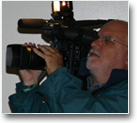
 |
  Why Do Men Like to Barbecue?FOR IMMEDIATE RELEASE Trent University History Professor Reveals How Barbecuing Originally a Cultural Form of Female Suppression Wednesday, April 15, 2009, Peterborough While the image of men proudly tending their backyard BBQs may appear the quintessential portrait of the 1950s father, Professor Dummitt suggests that there was a lot more going on underneath the surface of this seemingly innocuous backyard ritual. “Barbecuing's masculine status arose out of broader changes in both postwar gender relations and notions of fatherhood; namely, an increased expectation that fathers be more involved in family domestic life,” he states. Men occupied an ambiguous place in postwar Canada's world of suburban domesticity. Men were expected to be at home and involved in family life but they couldn't be seen to be too 'feminine'. Barbecuing, with its representation as a leisure pursuit as opposed to other more mundane forms of cooking, could, in this context, be remade as manly with joking references to meat and fire. Prof. Dummitt notes that when we seem to have come so far from the gender attitudes of the 1950s, it is worth thinking critically about why we still tell so many of the same old jokes about barbecuing and men. Why do men still barbecue? And what does this tell us about how far we have or haven’t come since the 1950s? -30- For further information, please contact Professor Christopher Dummitt, History Department, Trent University, at (705) 748-1011, ext. 7224 |

































 Through his examination of popular literature and
advertisements of the 1950s, Trent University history
professor Dr. Christopher Dummitt has revealed how
barbecuing was actually a way of renewing traditional
inequalities between men and women for the suburban age.
Through his examination of popular literature and
advertisements of the 1950s, Trent University history
professor Dr. Christopher Dummitt has revealed how
barbecuing was actually a way of renewing traditional
inequalities between men and women for the suburban age.